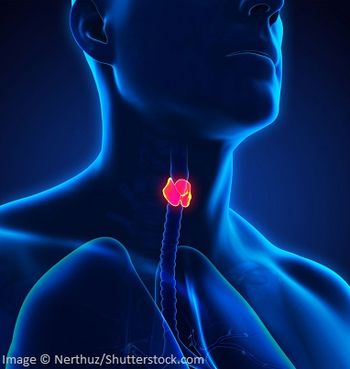
Potential Gene Mutation May Help to Identify Familial Thyroid Cancer
A new gene mutation, DUOX2, may cause a type of familial thyroid cancer, according to study results published in Cancer Research.
A new gene mutation, DUOX2, may cause a type of familial thyroid cancer, according to study results published in Cancer Research.
"Thyroid cancer is common and on the rise, and hereditary non-medullary thyroid cancers account for 6%-10% of cases," lead study author Darrin Bann, MD, department of otolaryngology-head and neck surgery, The Pennsylvania State University, College of Medicine in Hershey, Pennsylvania, said in a press release, adding that this mutation is the first and only mutation associated with familial thyroid cancer to be identified in a gene that is primarily expressed in the thyroid gland. "Prior to this study, there was not much data to explain why this type of cancer was highly heritable."
Researchers from Penn State College of Medicine identified a family that included 8 individuals diagnosed with thyroid cancer across 4 generations. Using next generation sequencing (NGS), they found that all of the family members with thyroid cancer had a mutation in a gene called DUOX2 - a rare mutation that provides information for the creation of a protein called dual oxidase 2 and only occurs once in every 138,000 members of the general population, according to the release.
After performing a series of biochemical analyses on the protein with the mutation, the researchers then found that the mutated version produced more hydrogen peroxide, rather than stopping the production of the chemical, meaning the excess amount may cause additional gene mutations, which in turn, may increase the risk for thyroid cancer.
"Hydrogen peroxide can harm genetic material through a process called oxidative damage," Bann explained in the release. "This may be a common theme underlying genetic risk for developing thyroid cancer. If we can identify more mutations that increase risk for oxidative damage, we may be able to develop preventative strategies, including treatments with antioxidants."
To further their research, Bann and colleagues evaluated whether the mutation was related to other genetic mutations associated with non-medullary thyroid cancers. Some individuals with sporadic thyroid cancers had a mutation that increased the amount of DUOX2 in the thyroid gland, suggesting that dysregulation of hydrogen peroxide may be the cause of other genetic mutations associated with thyroid cancers, according to the release.
"The individuals with thyroid cancer in the family we studied had a mutation in a gene that is related to thyroid tissue," Bann said, adding that this knowledge can help create new models for studying thyroid cancer in the lab and the development of prevention strategies. "Finding other families and individuals with this mutation will be essential for confirming our findings."
Reference:
1. Bann DV, Jin Q, Sheldon KE, et al. Genetic Variants Implicate Dual Oxidase-2 in Familial and Sporadic Nonmedullary Thyroid Cancer. Cancer Research. 2019;79(21):5490–9. doi:10.1158/0008-5472.CAN-19-0721.
2. EurekAlert. Researchers identify new gene mutation in familial thyroid cancers. Published November 20, 2019.
Newsletter
Stay up to date on recent advances in the multidisciplinary approach to cancer.



































